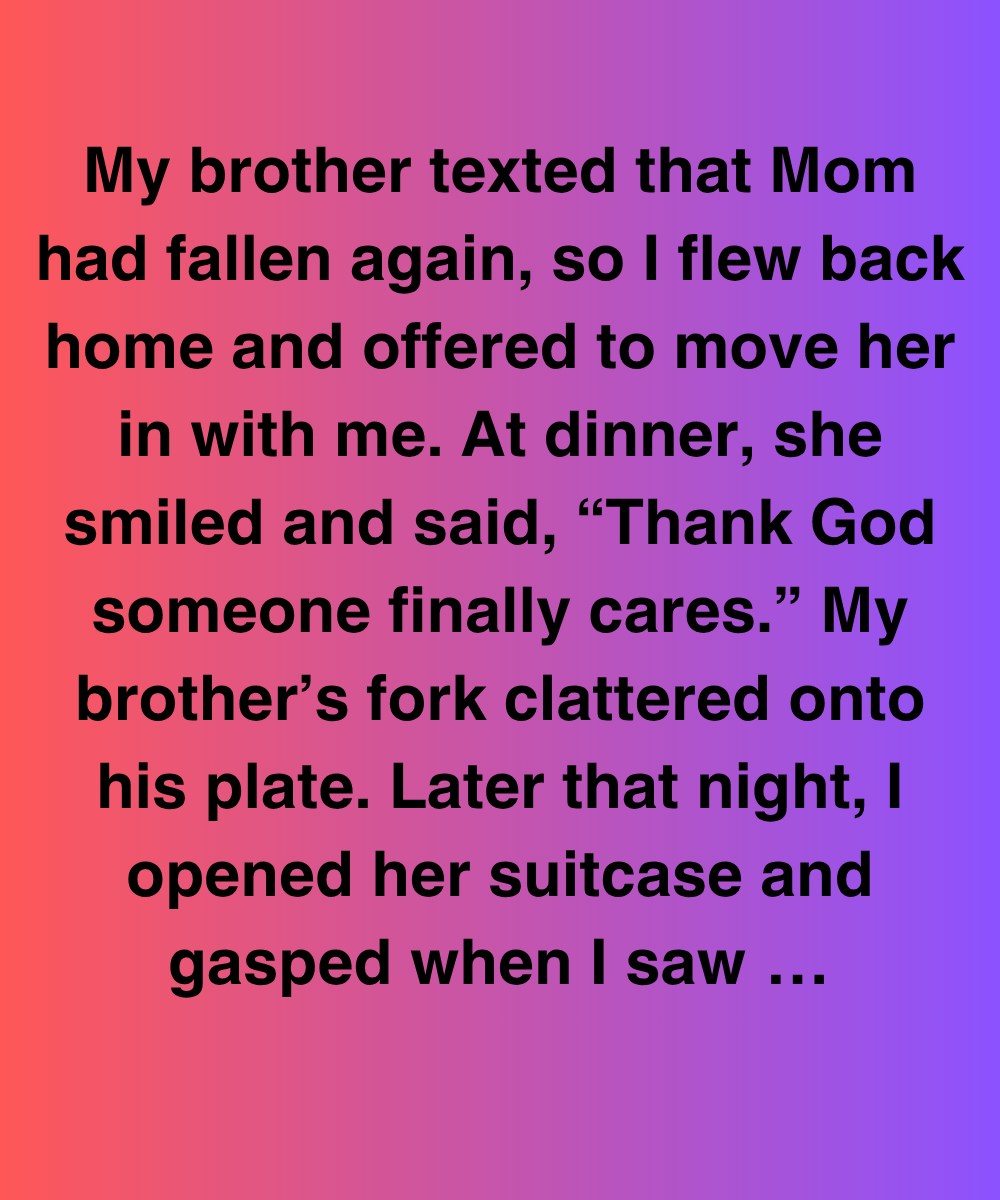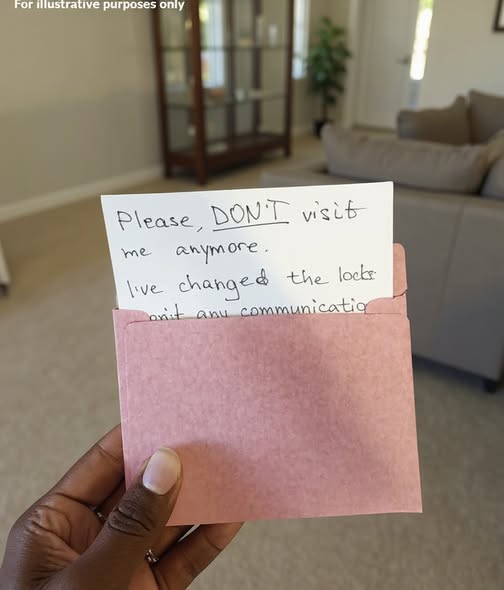
My brother texted that Mom had fallen again, so I flew back home and offered to move her in with me. At dinner, she smiled and said, “Thank God someone finally cares.” My brother’s fork clattered onto his plate. Later that night, I opened her suitcase and gasped when I saw her house keys, a jewelry box I hadn’t seen since Dad died, and an envelope marked “DO NOT TRUST MARCUS.”
Marcus is my brother.
I sat down on the bed, stunned. Mom had always been private, but this? That envelope sat like a threat between us. I debated whether to open it. My first instinct was to wait—ask her about it calmly in the morning—but something in my gut told me I wouldn’t sleep if I didn’t know.
So I opened it.
Inside was a handwritten note, in her careful, looping cursive. It read: “If you’re reading this, I’ve finally left. Marcus has been taking money from me. Thousands. I tried to ignore it, tried to believe he was struggling. But he’s changed. I think he’s gambling again. Please don’t confront him. Just protect yourself.”
My chest tightened. Gambling? Again?
Marcus had racked up debt in his twenties, but after Dad passed, he promised us he’d turned a corner. I’d believed him. We all had. I even loaned him five thousand once, which he repaid in slow trickles over three years.
I folded the note and put it back.
The next morning, I made coffee and tried to act normal. Mom shuffled into the kitchen in her pink slippers, hair a mess, but her eyes sharper than I expected. She sat down quietly and said, “You found the note, didn’t you?”
I nodded.
She sighed. “I didn’t want to bring it into your home, but I also couldn’t keep it a secret anymore. He promised he’d stop. But when I fell last week… I called him first. You know what he said?”
I shook my head.
“He said, ‘I can’t deal with this right now, Mom. I’m busy.’ Then he hung up.” She stared into her cup. “I lay there for three hours before I managed to crawl to the phone again and call my neighbor.”
I felt rage flicker in my stomach, but I held it down. “Why didn’t you tell me sooner?”
She looked up at me, tears threatening to spill. “Because he’s still my son.”
For the next few days, we tiptoed around it. Marcus didn’t call. Didn’t check in. Which was strange, considering we’d just moved Mom out of her house.
I called him myself. Straight to voicemail.
Two weeks later, I got a text. “Hey, can we talk?”
We met at a local diner, somewhere neutral. Marcus looked thinner, tired. He smiled weakly. “How’s Mom?”
“She’s doing better,” I said. “You haven’t checked in.”
He rubbed the back of his neck. “I figured she needed space. Look, I know you probably heard some things…”
I cut him off. “Did you take money from her?”
He blinked. “She said that?”
I said nothing.
He sighed. “Okay. Yes. But not how you think. It wasn’t gambling. Not this time. It was for a business thing.”
I raised an eyebrow. “A business thing?”
“Real estate investment. A friend of mine was flipping a house. I thought it would be quick, clean. I just needed capital. She had savings. I was gonna pay her back.”
“Did you tell her that?”
He looked down. “No.”
I shook my head. “You lied to her. You took her money, ignored her calls when she fell, and now you’re trying to spin this as a business opportunity?”
“I panicked,” he admitted. “I thought if I just had one win, I could fix everything.”
“But you didn’t win, did you?”
He didn’t answer.
That night, I told Mom everything. She just nodded. “That’s what I thought,” she said. “He never could resist shortcuts.”
It hurt, watching her say that. Not angry, just tired.
A month passed. Mom settled into my guest room. She started walking better, laughing more. She baked again. The house smelled like my childhood.
Then one afternoon, I got a call from a woman named Tasha. She said she was Marcus’s girlfriend.
“I know this is weird,” she said. “But I didn’t know who else to call. He’s not doing well. He’s talking about leaving town. Says everyone’s against him.”
My stomach sank. “He stole from our mom.”
“I know,” she said quietly. “I just thought you should know—he pawned her wedding ring. Said it was his to take.”
I froze. “Her ring was in the suitcase when she moved in.”
There was silence. Then: “No, it wasn’t. I saw him take it from her jewelry box a month ago. Before she left. I begged him not to.”
After the call, I went straight to Mom’s room and opened the small velvet box.
Empty.
She walked in behind me, saw my face, and immediately understood. “He took the ring?”
I nodded.
She sat down slowly. “That was the last thing your father gave me. Before he got sick.”
“I’ll get it back,” I said.
“No,” she said. “Let it go. I just want peace.”
But I couldn’t.
I called Marcus again. This time, he answered.
“You stole her ring.”
Silence.
“You pawned Dad’s ring?”
“I needed money.”
“You don’t get to do this and walk away. I’m going to the police.”
He laughed bitterly. “Go ahead. She won’t press charges. She’s too soft.”
He wasn’t wrong. She’d never do it. But I could.
I drove to the pawn shop that weekend, using the address Tasha had given me. The clerk, an older man with yellowed glasses, recognized the ring immediately. “Guy said it belonged to his wife, wanted cash fast.”
I showed him a photo of Mom and Dad’s wedding day.
“That’s it,” he said. “Sentimental piece. Sad how often that happens.”
I paid more than I could afford to get it back. I didn’t tell Mom. Not yet.
When I walked through the front door, I saw her asleep on the couch, a blanket tucked under her chin. Her favorite old movie was playing on mute.
I placed the ring box gently on the coffee table.
She saw it later that night. I heard her gasp from the hallway.
I peeked in. She was holding it like it was made of glass.
“You got it back?”
I nodded. “No one pawns your memories. Not on my watch.”
She burst into tears. So did I.
Weeks passed. Marcus didn’t call again. Mom started attending local art classes, made new friends. She looked five years younger.
Then, something unexpected happened.
Tasha showed up at our door.
She held a small folder and looked nervous. “I’m pregnant,” she said. “I left Marcus. I’m keeping the baby.”
We let her in.
She sat at the kitchen table, fidgeting with a paperclip. “I want this child to have better. I just… I need some support. Even just advice.”
Mom reached over and touched her hand. “You came to the right place.”
And just like that, Tasha became part of our lives.
She started visiting every Sunday. Sometimes just for coffee, sometimes to vent. When the baby was born—a girl named Layla—we were both there.
Marcus never showed up.
We later heard he’d left the state. Rumor was he tried starting a business in Phoenix. It failed. Then nothing. Silence.
Mom never asked about him. I think she grieved the idea of him more than the man himself.
Over the next year, we built something new. Not perfect. But real.
Mom grew stronger. Layla grew fast. Tasha found a job, then a better one. And I found peace I didn’t know I’d been craving.
One afternoon, as we sat watching Layla waddle through the garden, Mom said, “You know what the hardest part is?”
I waited.
“Letting go of who we thought someone would be.”
I nodded. “And the best part?”
She smiled. “Seeing who actually shows up.”
That stuck with me.
Marcus was family by blood. But family is more than that. It’s who shows up when you fall. Who returns what matters. Who helps you build again.
And sometimes, family walks in the door not because they have to—but because they choose to.
Tasha did.
And now, Layla calls me “Auntie,” and Mom is “Grandma.”
The other day, I took a photo of the three of them curled up on the couch, cheeks pressed together, laughing over a shared bowl of popcorn.
I looked at it and thought, This wasn’t the life I expected—but maybe it’s the one I needed.
If there’s one thing I’ve learned, it’s this:
People will disappoint you. Sometimes the ones closest to you. But don’t close your heart. Because someone else might be waiting, ready to fill that space in ways you never imagined.
Share this story if it reminded you of someone who did show up. And maybe drop a like—it helps more stories like this reach the people who need them.




